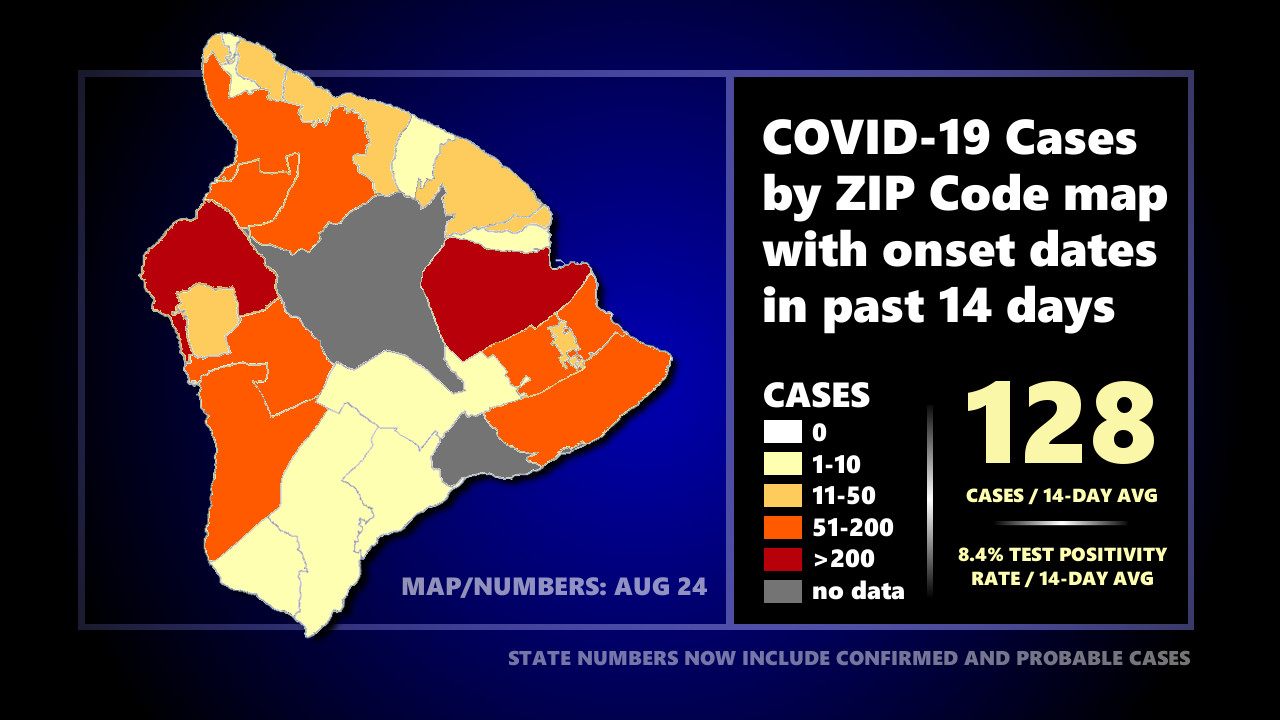(BIVN) – There were 565 newly reported cases of COVID-19 in the State of Hawaiʻi on Tuesday, down slightly from the 571 cases identified on Monday. There were 100 new cases identified on Hawaiʻi island, down from the 107 reported the day before.
According to the Hawaiʻi Emergency Management Agency, there were sixty-two (62) persons hospitalized today on the Big Island, down from the previous report of sixty-four (64) .
Health officials are currently monitoring 1,671 active cases on Hawaiʻi island. The test positivity rate on the Big Island over the last 14 days increased to 8.4%, and there has been a 14-day average of 128 new cases per day.
On the Health Department’s zip code area map showing reported COVID-19 cases with onset dates in the past 14 days, there are now fifteen (15) zip code areas on the Big Island showing over 10 cases. Eight (8) of those zip code areas are showing over 50 cases, with two areas (Kona and Hilo) identifying over 400 new cases in 14 days.
- 96720 (Hilo) – 471 cases
- 96740 (Kona) – 407 cases
- 96743 (Kohala) – 106 cases
- 96738 (S. Kohala) – 77 cases
- 96755 (N. Kohala) – 25 cases
- 96727 (Hāmākua) – 42 cases
- 96773* (N. Hilo) – 12 cases
- 96783 (Pepeʻekeo) – 11 cases
- 96749 (Puna) – 142 cases
- 96760 (Puna) – 22 cases
- 96771 (Puna mauka) – 57 cases
- 96778 (Puna makai) – 59 cases
- 96725 (Kona) – 46 cases
- 96750 (Kona) – 50 cases
- 96704* (South Kona) – 64 cases
* The 96773 zip code area includes zip code areas 96710, 96774, 96728, 96764, and 96780. The 96704 zip code area includes zip code areas 96726.
“The State and Island of Hawaii are experiencing wide-spread community-based transmission of the Coronavirus,” the Hawaiʻi County Civil Defense repeated in a Tuesday radio message. “We should do our best to slow the spread by limiting our activity in public to only essential needs. If you do go out, minimize your risk to potential exposure by wearing face coverings, maintaining physical distance of at least 6 feet from others, washing your hands with soap and water often, and reducing the size of or avoiding social gatherings. If you are sick, stay at home unless seeking healthcare.”
To date, the State of Hawaiʻi says 1,833,678 cumulative doses of COVID-19 vaccine have been administered. Health officials say 62.1% percent of the State population has been fully vaccinated. 70.4% of the population has initiated vaccination. On Hawaiʻi island, 59% has now completed vaccination.
Monoclonal Antibody Treatment Available At North Hawaiʻi Hospital
From a Queen’s North Hawai’i Community Hospital news release on Tuesday:
Queen’s North Hawai’i Community Hospital is expanding the use of Regeneron’s REGEN-COV2, a combination of two monoclonal antibodies. This intravenous treatment is provided on an outpatient basis to COVID patients; studies show that it can reduce the chances of hospitalization and death by up to 70 percent, as well as shorten the duration of symptoms. Initial doses have been successfully given in the QNHCH emergency room; QNHCH has dedicated a clinic to this new treatment and there is ample stock nationwide.
The Regeneron product is authorized for individuals 12 and over with mild to moderate COVID-19 who are not hospitalized and don’t need supplemental oxygen. The treatment is effective within 10 days after symptoms appear, which is why it is critical that people seek treatment as soon as they receive a positive test result. For the therapy to be most effective, it needs to be taken as soon as possible. Receiving treatment earlier, when symptoms are less severe, may help prevent progression of the disease that would otherwise require hospitalization.
It can also be given preventatively to people exposed to the coronavirus and who are at high risk of serious consequences. A large clinical trial that found the antibodies prevented symptoms in household contacts of people who recently tested positive.
“When the pandemic started, there was no specific treatment for COVID-19. With monoclonal antibody therapy, there is now an easy treatment that takes only 2-3 hours to help prevent severe symptoms and hospitalization,” said Cindy Kamikawa, President, QNHCH. “This therapy can be extremely effective, but it is not a replacement for vaccination. We still need everyone to get vaccinated to break the virus’ chain of transmission.”
For mild to moderate COVID-19, monoclonal antibodies are available within 10 days to those who:
– Are high risk for developing severe COVID-19 and
– Have a positive COVID-19 test and have not yet been admitted to the hospital and
– Are 12 years of age or older (and at least 88 pounds)For post-exposure prevention, monoclonal antibodies are available within 10 days to those who:
– Have been exposed and
– Are at high risk for developing severe COVID-19 and
– Are 12 years of age or older (and at least 88 pounds) and
– Not fully vaccinated or vaccinated but immunocompromisedAfter receiving monoclonal antibody therapy, it is recommended that individuals wait 90 days before receiving the COVID-19 vaccine. If someone already received the first dose of vaccine before monoclonal antibody therapy, current CDC guidelines recommends waiting 90 days before receiving the second dose.
For more information or to be screened to see if you are a candidate for monoclonal therapy, please call the QNHCH Monoclonal Clinic at 881-4833.


by Big Island Video News7:36 pm
on at
STORY SUMMARY
HAWAIʻI - Officials say there were 62 people hospitalized with COVID-19 on Hawaiʻi island today, part of the 403 in the hospital statewide.